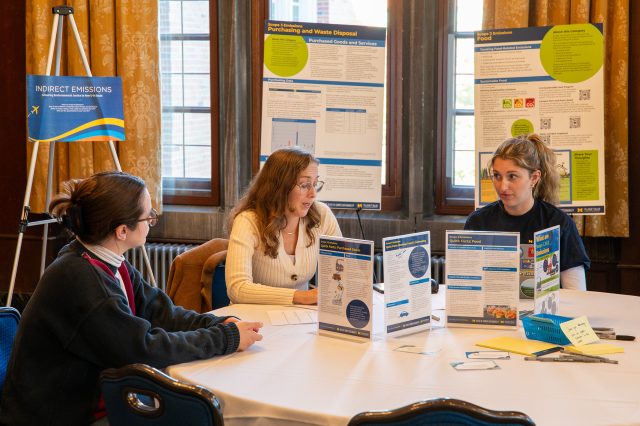[ad_1]
More than 250 University of Michigan students, faculty and community members gathered in the Rogel Ballroom of the Michigan Union for the LSA DEI x Sustainability Summit Wednesday. The event aimed to celebrate International Campus Sustainability Month and the second year of the University’s DEI 2.0 strategic plan, a five-year program to increase diversity, equity and inclusion across campus.
The event began with an introduction from LSA Dean Rosario Ceballo, followed by a keynote speech by Shalanda Baker, the new vice provost for sustainability and climate action. After the keynote, a panel of U-M faculty and students discussed intersectionality, environmental justice and recognizing privilege. The summit also included several small creative workshops throughout the day, including an interactive sustainability mural and a Black Nature Walk through Nichols Arboretum.
Caitlin Jacobs, LSA sustainability program manager, told The Michigan Daily that event organizers hoped the summit would provide a space for open conversations about environmental justice.
“We wanted to make space for the personal aspects of DEI, thinking about yourself and your community as part of this, but also thinking about this environmental justice component,” Jacobs said. “I think that Michigan is full of people who want to see that.”
Jacobs said the event was designed so audience members could evaluate the history of sustainability efforts and meaningfully discuss the intersection of systemic racism and sustainability practices.
“I think that there are a lot of people on campus who see these intersections already,” Jacobs said. “I’m seeing a transformation in how the sustainability students I work with here talk about these issues versus how I talked about them when I was a younger person. Doing an event like this … makes you ask questions about your own biases and how you do your work.”
Baker began her talk by highlighting the connection between sustainability efforts and inclusivity, focusing specifically on the energy systems in place that perpetuate environmental injustice.
“Racial and ethnic minorities in this country are exposed to more pollution, and the problem is structural,” Baker said. “We know this because of the design of our energy system, we have cited facilities in low-income communities, communities of Color and rural communities.”
Baker also discussed her father’s experience growing up in Port Arthur, Texas — a sacrifice zone, or area where residents are exposed to disproportionately high levels of toxic pollution, transformed by the influence of pollution and environmental hazards due to its proximity to energy plants. Baker said her father suffered from health complications due to the poor air quality.
“He died in his early fifties, which is also a result of growing up in an environmental injustice community,” Baker said. “This is still a Latinx, Black community, and it’s one that, again, many people over the world know because it’s one of the most dense cases in terms of oil and gas infrastructure.”
Having seen the impact of these zones firsthand, Baker spoke about the current reality for those living in Port Arthur today. She also discussed how individuals currently living in similar communities have conflicting feelings about transitioning to greener energy sources.
“What I know from my last job in the Biden-Harris administration is that this very community is also being sought out for the aggressive decarbonization efforts that we are undertaking in this country,” Baker said. “And so the question these communities are asking is, ‘What is in it for us in this energy transition?’”
Rackham student Samantha Adams brought this issue closer to home by discussing the Flint water crisis.
“Residents reported foul smelling, looking and tasting water from the tap water systems, nearly 9,000 children were supplied with contaminated water for 18 months, and the Michigan Civil Rights Commission concluded that the neglect of Flint residents by the city was a result of systemic reasons,” Adams said.
Political science professor David Temin continued the discussion about environmental injustice in a roundtable discussion that followed the keynote. Temin said this injustice is structural, coming from systemic practices that disproportionately harm marginalized communities.
“Environmental injustice is material and structural; it is not primarily about personal behavior,” Temin said. “It’s about where the factories go, where the waste dumps are, where the mines go, who benefits and who is made vulnerable, disposable.”
Daily Staff Reporter Elizabeth Foley can be reached at elfoley@umich.edu.
Related articles
[ad_2]
Source link











